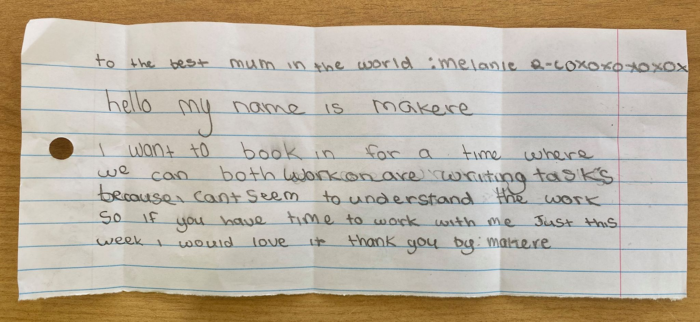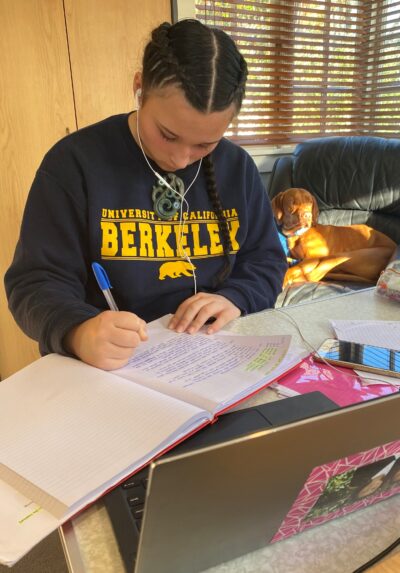School-led learning at home
By Melanie Riwai-Couch on October 31, 2019 in Cultural capability
Voices of parents of Māori and Pasifika students
Last week, like many parents, I was faced with supporting my children with their school-work at home, while also trying to work and manage the expected anxieties of living through a global pandemic. My daughter Makere (10) developed her own system for getting my attention, as shown below.

Many of my friends were posting on Facebook about what was happening in their homes, with their children, and I wondered if it was really all that bad, and what positives might be happening as well. Personally and professionally, my research interest was piqued and I decided to collect some voices using an online survey for Māori and Pasifika parents.
I was excited to have more than a hundred responses overnight. On my first reading, the voices seemed to express equal measures of excitement, anxiety and frustration. For example, parents said:
“I get to be part of their ako. I feel useful.”
“I can put more of my own teaching and parenting philosophy into the day. Flexibility around time starting and following their lead. No commute to and from school, and can I add, no kutu.”
“Am I good enough?”
“That schools … expect too much in this situation.”
“I get stressed trying to work with them and feel they are not getting the best they can from this.”

I felt that the quantity and complexity of the responses I had received deserved careful analysis and needed a timely response. I also wanted to honour the time and thought that parents had put into the responses. I quickly realised I would need help with this mahi. With that in mind, I assembled a team from my colleagues at Evaluation Associates and also a long-time colleague from the University of Canterbury. Together we analysed the responses into themes and thought about “the big picture” messages the voices of parents were providing.
As a team, we recognised that we needed to provide a rapid, but not rushed, articulation of the diverse points of view generated in the survey. We also wanted that articulation to be clear and coherent. Our work together modelled values of openness, truth-seeking and shared commitment. The data analysis and writing processes were organic and iterative. Hopefully, the end product has a coherent tone and the messages are clear.
Listening to those parent voices we found that there were major tensions for them as they supported school-led learning at home:
…between enjoying the freedom provided by the current situation and anxiety about children falling behind.
…between what some schools are expecting and what is realistically manageable.
…between opportunities for relationships within whānau to be strengthened and concerns about children missing out on their relationships with friends.
Parents identified benefits of school-led learning at home. Many parents have taken delight in the opportunity to learn with, from and about their children. In particular they said that:
They liked the chance to be flexible about learning.
They were grateful for the support being provided by schools and the teachers’ efforts to continue teaching.
They loved getting to know their children as learners – their learning strengths and challenges.
Parents also shared concerns, for example:
They did not feel well equipped to support academic learning at home.
They were under pressure to meet their own work commitments.
They were under pressure to support learning for children at different ages and stages.
Equity and access – resources and technology, printing of materials etc.
There are many lessons to take from the voices of parents. For now, we have provided reflective and planning questions that teachers and school leaders can ask that are framed around the findings. For us what stood out was that, at the moment, “School-led learning at home” is what we have – in contrast, we hope in the future there will be more “home-led learning at school”. This is an opportunity to think differently about curriculum and relationships between schools and families going forward.
Click below to download the paper.
School-led learning at home Voices of parents of Māori and Pasifika students
Acknowledgements
Thank you to the parents who entrusted us with their voices and also to those who provided images of their children learning at home that have been used in the report.
What started as an individual endeavour to collect parent voices from our Māori and Pasifika communities quickly became a collaborative project. I wish to acknowledge the University of Canterbury and the contribution of both Angus Hikairo Macfarlane, Professor of Māori Research who has provided a foreword to the research and Leali’ie’e Tufulasi Taleni who was a contributing author. This paper was a team effort including co-authors from Evaluation Associates | Te Huinga Kākākura Mātauranga: Ally Bull, Brenda Ellis, Kerry Hall, Jane Nicholls, and Richard Watkinson.
Other articles you might like
Was that Participation? Partnership? Protection? Or… Consultation?
What’s your community’s vision?
O tu, aganu’u, ma agaifanua a le tamaititi o le a le mafai ona ulufale atu I le potuaoga sei vagana ua fa’atauaina me faaulufaleina muamua I le loto ma le agaga o le faiaoga.
The culture of the child cannot enter the classroom until it has first entered the consciousness of the teacher.
Samoan proverb
